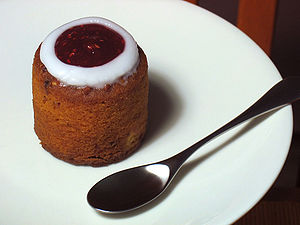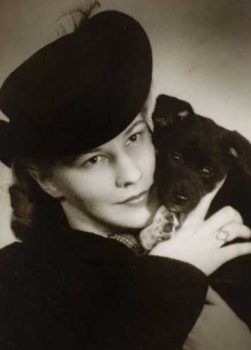Search results for "2011/04/2010/05/song-without-words"
Literary glory and basketball
23 November 2012 | This 'n' that
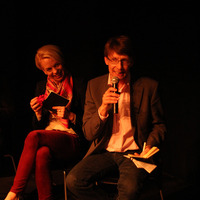
Fights with words: Baba Lybeck and Markus Nummi. Photo: Literary Death Match
Fans of new writing and competitive reading out loud converged on Korjaamo in Helsinki on October 25th for the second Finnish ‘episode’ of Literary Death Match. LDM (as it’s known to regulars) is a series of events created in the USA and hosted by Adrian Todd Zuniga in which authors perform live readings of their recent work and receive critical assessments from a panel of judges in a manner familiar to viewers of trashy TV talent shows.
The winners of the evening’s initial reading rounds advance to the final, where the ultimate victor is decided in a game show-style battle involving skills that are perhaps more tangential to the work of most authors.
In his shiny jacket, LDM co-founder Adrian Todd Zuniga certainly looked the part of the cheesy game show host. He was an enthusiastic compère and got the bilingual evening under way by introducing the panel of judges. Author Markus Nummi was to be responsible for assessing the competitors on literary merit, while Baba Lybeck, a radio journalist and host of Uutisvuoto (the Finnish TV version of the BBC’s topical panel show Have I Got News for You), would be awarding points for performance. The third member of the panel was journalist and author Ari Lahdenmäki, who was assigned the category of ‘Intangibles’, i.e. anything that didn’t fall under the other two headings. More…
Mishaps, perhaps
30 September 1976 | Archives online, Fiction, poetry
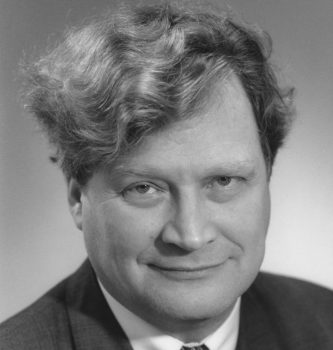
Jarkko Laine. Photo: Kai Nordberg
Jarkko Laine (born 1947) writes both prose and verse. He is the author of several hilarious and highly imaginative novels and a pioneer of the generation of Finnish underground poets. One of the most productive of younger Finland’s poets, he draws on the language and forms of mass commercial entertainment, comics, and pop music to write about people of today.
He is currently the editorial secretary of the literary periodical Parnasso. The poem below is from his latest collection Viidenpennin Hamlet (‘Fivepenny Hamlet’, Otava 1976)
![]()
1
In Turku again
the taxi’s travelling East Street
whose wooden sides have gone,
the radio’s laryngeal with static, VHF, the driver’s
telling me the tale,
the ice hockey season’s on us already,
even though there’s rain, green in the park,
I’m staring at the lifted houses
stuffed with sleeping persons,
the landmarks are going out one by one, all of them,
you might as well be
in the middle of the sea in a rubber dinghy,
soon I shan’t recognize anything here but
the cathedral, the castle,
my own name in the telephone directory. More…
A thankless task?
24 November 2011 | Letter from the Editors
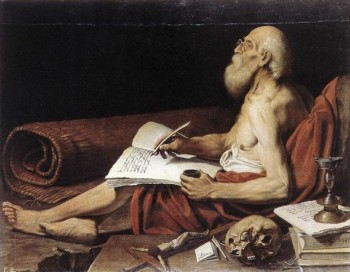
Translator at work: St Jerome, translator of the Latin Bible in the late 4th century, is the patron saint of translators and librarians. Leonello Spada's 1610s painting, Galleria Nazionale d'Arte Antica, Rome. Picture: Wikimedia
Why translate, asked the late Herbert Lomas thirty years ago in an issue of Books from Finland (1/82) – the pay’s absurd, one’s own writing suffers from lack of time, it’s very hard to please people. And public demand for translation from minor languages into English was almost non-existent.
But he also admitted that translating is generally a pleasurable experience: ‘You have the pleasure of writing without the agony of primary invention. It’s like reading, only more so. It’s like writing, only less so.’ More…
The almost nearly perfect travel book
4 April 2014 | Articles, Non-fiction
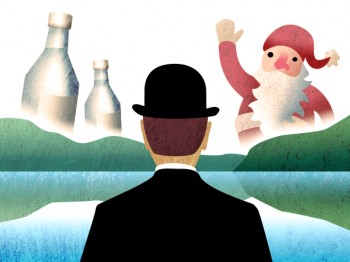
Illustration: Joonas Väänänen
The question of what foreign people think of us Finns, and Finland has always been a particularly burning one in these latitudes: a young nation, a small people. Can we be as good as bigger and wealthier nations? Tommi Uschanov reads a new book on the Nordic countries published in England, keeping a sharp eye on what is being said about…. Finland, naturally
When an article based on The Almost Nearly Perfect People: The Truth About the Nordic Miracle by Michael Booth was published last January in the London Guardian, there was a nationwide outcry in Finland. ‘Finland being bashed in the British media,’ one tabloid headlined grandiosely, while a sober financial paper spoke of ‘a broadside full of stinky stuff’. It takes a re-reading of the article after having read the book to understand why. To create an artificial atmosphere of controversy, the article is lop-sidedly critical of Finland in a way which the book goes out of its way to avoid.
The Almost Nearly Perfect People belongs in a by now time-honoured genre within English letters: the humorous encomium to a host culture by an expatriate – or immigrant, as we hosts impolitely insist on calling them. The only difference is that Michael Booth, a British food and travel writer, does not discuss only Denmark, where he has lived for a decade, but visits each of the other four Nordic countries in turn. More…
Kari Hotakainen: Ihmisen osa [The human lot]
9 October 2009 | Mini reviews, Reviews
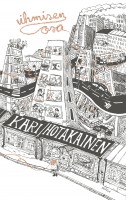 Ihmisen osa
Ihmisen osa
[The human lot]
Helsinki: Siltala, 2009. 276 p.
ISBN 978-952-234-021-4
30 €, hardback
Kari Hotakainen (born 1957) is one of Finland’s most internationally successful contemporary authors, and is widely known for his children’s books, plays and television screenplays. Like many of Hotakainen’s other works, Ihmisen osa is a contemporary novel, but it is one that sees the author being angrier and more ferocious than before; this is a story that will move readers and make them laugh. Its plot gets off to a slightly ungainly start: an impatient writer wants to ‘buy someone’s life’ for the purpose of turning it into material for a novel and is prepared to pay an elderly widow €7,000 for hers. A former yarn-seller tells him all about her life as she remembers it, and the writer writes it up into his own book – the husband’s wilful silence, a serious accident suffered by one of the three children, gradually being revealed. Having got the beginning out of the way, Hotakainen then puts his foot on the gas: in his laconic style he throws light on the conditions at the edges of contemporary working life: the business of selling images, selfishness and greed, the power of words. The yarn-seller writes to one of her children: ‘Don’t rise above your station. There’s no air up there, and you’ll get dizzy.’ Hotakainen’s novel Juoksuhaudantie (‘Trench Road’) was awarded the Finlandia Prize for Fiction in 2002. It has been translated into 17 languages and was awarded the Nordic Council’s Literature Prize in 2004.
Let us eat cake
4 February 2010 | This 'n' that
Here at Books from Finland central we’re celebrating, with the one Finnish literary anniversary that involves its own dedicated cake.
The fifth of February marks the birthday of the poet J.L. Runeberg (1804–1877) – writer, among many other things, of the Finnish national anthem (actually unofficial, as there’s no mention of such a thing in the legislation), which he wrote in Swedish, Vårt land (in Finnish, Maamme). More…
A day at the zoo
23 December 2009 | Children's books, Fiction
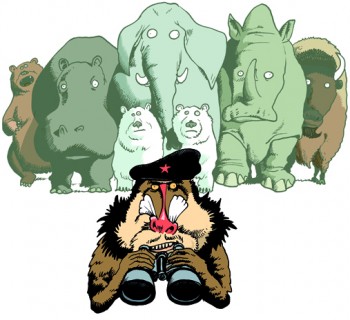
Extracts from the children’s book Zoo – eläimellinen tarina (‘Zoo – a bestial story’, WSOY, 2009, illustrated by Pertti Jarla)
The place: A zoo, once the property of the city, now privatised and accountable to corporate stockholders
The characters: The animals of the zoo, in particular Gandhi, a Sumatran tiger (false-teeth, poor vision, pacifist), Che, a male mandrill baboon (militant), and Mother Teresa, a hammer-headed bat (elderly); the zookeeper Sihvonen (stands up for the animals, recently fired); the new zoo director (whose main goal is to maximise profits); the shareholders’ committee (awaiting their earnings)
The action: after a demonstration in which all the animals played dead, the animals are staging a revolution to demand that Sihvonen be reinstated
![]()
The animals crowded into the foyer. The hallway was full of every kind of creature, with all of their skin, fur and feathers steaming in the warm indoor air. Che stood at the top of the the stairs, looked down at his troops, and gave the order in mime for everybody to be quiet.
‘Reconnaissance?’ he said, his voice subdued.
‘Ready!’ the leaf-tailed geckos announced.
‘Head in!’ Che commanded. More…
Self-made life
2 April 2011 | This 'n' that
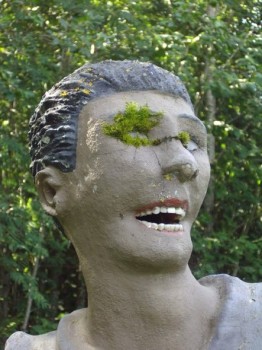
Art & nature: one of Veijo Rönkkönen's sculptures. Photo: Soila Lehtonen
You may perhaps remember an article entitled Self-made man, published on these pages in 2009: the sculptor Veijo Rönkkönen lived on a small, isolated farm in Parikkala, eastern Finland, where he spent his spare time building a garden of five hundred figures of concrete.
He lived in a cottage in the middle of his garden. Rönkkönen died a year ago, at the age of 66, and the future of his park, open and free to all, was unsolved for a while, as the Parikkala authorities were not willing to foot the bill for the upkeep the place – despite the fact that more than 25,000 people visit the park each year.
Now, the problem of the upkeep of the statue park, a ‘total work of art’, has been solved, as a businessman has bought the garden from Rönkkönen’s estate. and a number of institutions and individuals, among them friends of art and voluntary workers, have pledged keep the park open to visitors.
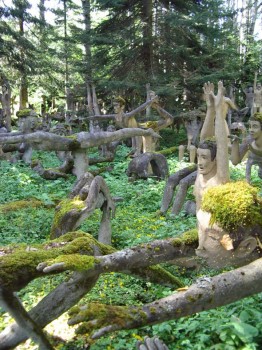
Yoga bare: Veijo Rönkkönen himself practised yoga. Photo: Soila Lehtonen
Photographer and writer Veli Granö introduced the life and works of this self-made artist in his book Veijo Rönkkösen todellinen elämä / The real life of Veijo Rönkkönen (Maahenki, 2007). Contemporary folk art goes by the acronym ITE, from the words itse tehty elämä, ‘self-made life’. The English-language term is ‘outsider art’.
The future of Rönkkönen’s cottage is undecided: it may become a park-keeper’s residence, or be used as an artist’s residence. Around it, the extraordinary legacy of this self-made artist – hundreds of statues, human and animal figures – will keep growing lichen and moss, ageing naturally.
The ladies’ dining club
30 September 1994 | Archives online, Fiction, Prose
From the novel Luonnollinen ravinto (‘A natural diet’, WSOY, 1994). Interview by Tuva Korsström
My dear, wise and ever-faithful secretary, colleague, friend and right hand, you who, without counting the hours, have been my helpmeet in many awkward situations, and not only in work matters but in others, all sorts of matters that belong to my private life and particularly those, you have remembered things that I have found hard to remember, like the birthday of my wife or some important colleague, and at Christmas you have always remembered me with some small gift, always different and always carefully chosen, of which I hardly need say how much it has warmed my heart, when I haven’t been able to do better than a single miserable hyacinth. And you have always reminded me of engagements I haven’t been able to keep track of: dentists, barbers, garages, less important and more important receptions, lunches and dinners, but what is most important, and why l am most grateful to you, is that in your generosity and open-mindedness – your eternal femininity – you have understood that a person in my position may sometimes find himself in situations whose consequences he cannot always control, and that he begins to be bothered by all sorts of people, although they should understand from the smallest hint that their company is not required, and you have sensitively but firmly turned them away, sometimes telling a little lie, and you have never, ever taken a moral stand or judged my actions, but have averted your eyes, having made the decision to accept that your boss is anything but perfect. For that reason I wish to express my gratitude to you; but not, however, unreservedly. Our seamless collaboration, my ever-lovable secretary, has meant that something belonging to me has begun to belong to you, that you have become part of me just as I have become part of my wife, even before she touches me with her fork. So I have no doubt that you, too, could appear at the dinner that is soon to be arranged. Bon appetit! More…
The personal and the political
In his new collection, Claes Andersson (born 1937) – poet, pianist and politician – takes a look at what human existence is about: excess, apathy, greed, devotion, freedom, and the simple pleasures of everyday life (see the introduction)
Poems from Lust (‘Desire’, Söderströms, 2008), translated by David McDuff and David Hackston
A Finnish translation, by Jyrki Kiiskinen, is entitled Ajan meno (WSOY, 2008)
(easter)
Despite the prognoses of the Earth's imminent warming today April 8 it is cold enough to make one’s teeth chatter In a few weeks I will turn seventy, my ninth grandchild August (Siiri's younger brother) was born two months ago and the tenth is on the way
Another darkness
30 September 1994 | Archives online, Fiction, poetry
Poems from Kali (Schildts, 1993)
‘Kali is the Liberator. Kali gives protection to those who know her. Kali is the Terrific One, the Destroyer of Time. As the Dark Shakti of Shiva, Kali is Space, Air, Fire, Water and Earth. Kali performs all the physical needs of Shiva. She is the Possessor of the Sixty-four Arts and increases the Joy of the Lord of Creation. Kali is the Pure Transcendental Shakti. Kali is the Night of Darkness.’
Kalika Purana
*
you show me a distant world
where all the beautiful is mine
you show yourself to me, naked, and whisper:
not the poppy
that murders the heroin addict,
not love
not my dark sister,
that will be the death of your love More…
Practically public
31 December 2002 | Archives online, Fiction, poetry
Poems from Koko tarina (‘The whole story’, Tammi, 2002). Introduction by Anselm Hollo
Pan shot
A whitewashed wall, small windows
advent calendar peepholes at the end of darkness,
lit-up squares
One two three kitchens awake at 7
each tenant bends over a kettle of porridge
in the gurgling coffeemaker’s soundscape,
opens the refrigerator
see the hunter in action: let’s spear this yoghurt
and the building across the way testifies to all of this
practically public activity
the evening’s closure of curtains, turnings-off of the light,
nocturnal breastfeedings. Talking windows. A light comes on at: 2:54 AM
– what’s up now?
Is someone thinking about a bird she encountered at the cemetery? More…

